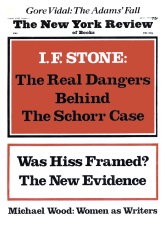In response to:
The War Between Men and Women from the December 11, 1975 issue
To the Editors:
In her review of books on rape [NYR, December 11], Diane Johnson notes, but does not further explore, the indifference of men towards this crime and their inclination to view the victim as at fault. Her essay prompted the following reflections on the male attitude to rape and possible motivations underlying it.
A man has only to imagine himself the victim of homosexual rape in order to evoke intense emotions which could provide a basis for empathy with women in this matter. In fact, this parallel may be the “rhetorical strategy…[for] enlisting the concern of men” which Ms. Johnson finds missing. Feminists may have refrained from pushing this analogy because they sensed it was very potent and feared it might make men too uncomfortable.
The stubborn refusal of empathy to women, the apparent apathy of men towards rape, is probably the result of an inner conflict between their knowledge that rape is evil and indefensible and a secret identification with the rapist. The motives of real rapists—young, uneducated, unemployed, usually black—probably have much to do with power, i.e., with achieving a temporary relief from self-contempt by, momentarily, being in a position of great power. But the ordinary man, who would never actually commit rape, is usually not thinking realistically about the subject; he is imagining what might make him want to rape. The clue to his motives lies in the usual “justification” for rape—the woman’s alleged sexual provocation.
If is not generally appreciated how much rage men feel at being sexually teased by women. That a man suffers from deliberate teasing is not rare and in any case the mere presence of an attractive woman is experienced as teasing by a lonely and sexually deprived man. The frustration of adult sexual drives is bad enough, but in addition it resonates with and activates early experiences of maternal deprivation. The man is teased not only by the woman’s unavailable genitals and body, but also by her withheld breast and love.
The experience is humiliating because the man must face his powerlessness, his inability to gain access to the woman he desires and whom he therefore hates, for depriving him of herself.
These experiences are universal, so that every man has in him some reservoir of hatred and cruelty towards women. When he hears of rape, he knows himself guilty in his heart of such a deed and, making no fine distinction between motive and act, imagines himself of one blood with the rapist and becomes an indifferent pursuer of justice.
Winslow Hunt, MD
Department of Psychiatry
College of Physicians and Surgeons
Columbia University
New York City
This Issue
April 1, 1976



